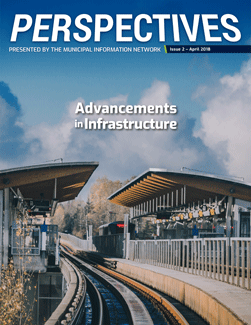The Vancouver Metro area has always been an innovative leader in regional transportation thinking. The region has particular vehicular issues with its limiting bridge crossings and its unique geography.
This recent infrastructure enhancement announcement shows the power of cities working together for regional goals in areas such as transportation. For commuters, where a city boundary ends doesn't mean anything they just want safe, reliable and affordable public transit.
The following announcement of Metro Vancouver's latest initiative offers an instructive and constructive blueprint for regional cooperation and innovation. It also shows the urgency of the three orders of government agreeing on strategies and getting the infrastructure money flowing into our communities.
The Mayors' Council and the Province of British Columbia have agreed on a plan to fund the regional share for Phase Two of the 10-Year Vision. This regional funding is another step forward to secure an historic investment in transit and transportation in Metro Vancouver.
Key elements of the plan for Phase Two include:
- Construction of Surrey-Newton-Guildford Light Rail
- Construction of Millennium Line Broadway Extension
- Significant upgrade of existing Expo-Millennium Lines to expand capacity to meet and improve the customer experience
- An 8% increase in bus service to address overcrowding, reduce wait times and bring bus services to communities with limited service
- Improvements to sidewalks, bikeways, multi-use pathways and roadways
This investment will ensure a sustainable regional share to continue to meet the demands of today and prepare for the future. In 2017 alone, there was a 6% increase in transit ridership. Demand for transit will only continue to grow as we add more than one million people to the region in the next 30 years.
It was imperative to the mayors and the Province that the funding model be fair for transit users, drivers, property owners and developers alike.
To deliver these projects, the Mayors' Council is proposing:
- $1.6 billion in fare revenues expected from higher ridership resulting from service expansion in Phase Two, TransLink resources and efficiencies.
- A 2% increase to all transit fares over two years beginning in 2020. This amounts to a five to 15 cent increase to adult and concession transit fares and 1 to 3 dollar increase to adult and concession monthly passes to pay for more bus improvements.
- 15 cents per hour increase for an average $5 per hour parking. This is an increase from 21% to 24% to the existing parking lot rate. Legislative amendments would be required to enable TransLink to make this change.
- $5.50 increase in property taxes per average household each year or about 46 cents a month, beginning in 2019.
- About $300 to $600/unit increase to the Development Cost Charge on new residential developments depending on type of dwelling. Legislative changes are required to enable the Mayors Council to levy the DCC.
- Revenue from a variety of transit-related commercial opportunities.
While securing regional funding is a critical step for Phase Two, moving forward in implementing this phase is subject to federal and provincial funding. Work continues between the province and Canada to finalize approvals, with more details on a senior government agreement expected in the near future.
"This is a huge win for transit users, drivers, cyclists and pedestrians. In addition to moving forward with the rapid transit projects, this funding agreement unlocks a massive investment that will continue the significant expansion to bus service across the region that kicked off last year. Residents have been asking for more transit service for many years and we are now in the position to get that service where it's needed."
—Derek Corrigan, Mayor of the City of Burnaby
"It is important that we get moving on Phase Two of the Vision as soon as possible to get people out of congestion, so they can spend more time with their families and less time stuck in traffic. We are giving Metro Vancouver the tools they need to be able to leverage the funding committed by senior levels of government so they can continue to meet the demands of a growing region."
Selina Robinson, BC Minister of Municipal Affairs and Housing and responsible for TransLink








